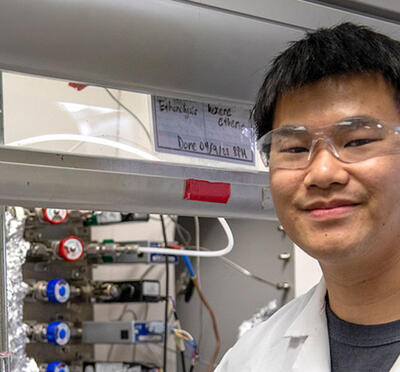An endowed professorship is quite an honor for academic faculty members, conferring a measure of prestige and distinction upon its holder. But the funding that comes along with the enhanced title can yield benefits that extend to graduate students, undergraduates, and even entire schools.
The Callahan Faculty Scholar Endowment Fund, established in 2011 by Darry Callahan ('64 B.S., Chemical Engineering) and his wife Betty, has provided several new faculty in chemical engineering with additional unrestricted funds to use during their initial appointment at Oregon State.
Kelsey Stoerzinger, assistant professor and the 2018-19 Callahan Faculty Scholar in Chemical Engineering, is using the funds to support two doctoral students working in her lab over the summer.
“Supporting students is a very productive use of endowment dollars,” Stoerzinger said. “It keeps their dissertation projects on track, enabling them to finish in a reasonable time. By employing them as graduate research assistants and covering tuition, this funding supports their studies and furthers the overall research efforts.”
Stoerzinger, whose expertise is in catalysis, has a passion for renewable energy. Much of her own research looks at ways to transform molecules from waste into useful fuels, feedstocks, and recovered resources. The catalytic materials that Stoerzinger works with include thin-layer films and metal oxides. Creating these materials and characterizing their functionality requires the use of advanced instruments and techniques not available at Oregon State.
Working over the summer, graduate students in Stoerzinger’s lab have traveled to Washington to use a pulsed laser deposition system at Pacific Northwest National Laboratory, and to California to use the Advanced Light Source at Lawrence Berkeley National Laboratory. Stoerzinger says these trips have produced benefits that go far beyond her own research program.
“Having hands-on access to this equipment and interaction with our colleagues at the national labs is a tremendous enhancement to the graduate educational experience,” Stoerzinger said. “Travel to remote facilities is much easier to arrange during the summer months, so there is a huge advantage in having research funding that extends beyond the academic year.”
The ripple effects from that funding can extend to undergraduates, even high school students. Stoerzinger’s students have mentored undergraduates through the Johnson Scholars program, and high school students visiting campus as part of the Summer Experience in Science and Engineering for Youth.
For the School of Chemical, Biological, and Environmental Engineering, the Callahan funding provided an extra bargaining chip that helped the school recruit Stoerzinger to Oregon State.
“Having year-round support for my students was really important to me,” Stoerzinger said. “The Callahan professorship bridged the gap between what the school was able to offer in startup funding, and the competitive offer that I ultimately accepted.”
School head Gregory S. Herman, James and Shirley Kuse Chair in Chemical Engineering, says he would like to develop more endowed professorships at CBEE.
“Endowed professorships like the Callahan Faculty Scholar in Chemical Engineering are crucial to our ability to recruit and retain highly competitive academic talent,” Herman said. “The funding provided by these endowments translates into extraordinary opportunities for our students. I want to us to be able to offer those opportunities to even more students.”


